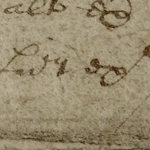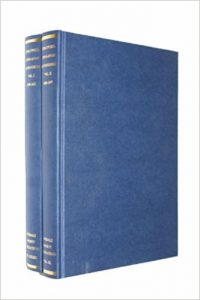What Happened to Shakspere’s Missing “Inventory”?
Bianchi and Campbell Explore Shakspere’s Will
December 26, 2017
When anti-Stratfordians point out that William Shakspere of Stratford-upon-Avon left no books in his will, and indeed there is no evidence he ever owned a book, orthodox Stratfordians often respond by hypothesizing that there must have been a separate “inventory” appended to the will that listed his books. But — alas! — they say this inventory has been lost to the ages.
Clearly, Stratfordians have become adept at fantasizing what the evidence for their man would be like if it actually existed. But how should Oxfordians respond? Stratfordians argue that even if they can’t prove the inventory existed, Oxfordians can’t prove it didn’t. Ergo, they say, stalemate.
Articles by Julie Sandys Bianchi and Harry Campbell in the Fall 2017 Shakespeare Oxford Newsletter, however, shed important new light on the issue. You can download a 5-page document containing both articles here. The full issue of the Newsletter is available here.
Bianchi’s article, “Brevity and the Soul of Witlessness,” tackles the Stratfordian claim that the almost illegible squiggle at the end of Shakspere’s will — often transcribed as “Jnm ext” or “Inm ext” — means “inventorium exhibitum” or “inventory attached.”

Bianchi, who has studied many wills in her genealogical research, says this interpretation made no sense to her because “inventories … were not typically attached to wills, but were completed after the wills had been entered for administration under probate.” Furthermore, when the phrase “inventarium exhibitum” (the actual correct spelling) appeared on wills (which was rare), it was always spelled out, not abbreviated, and one would expect to see a numerical value alongside the words, about the financial assessment of the estate.
Finally, “inventarium exhibitum” had nothing to do with an inventory being attached to a will; rather, “it was applied as part of a reference to the total assessed monetary value of the inventory of the testator’s worldly items and cash, minus what was owed by the estate at the time of death. It was part of a financial receipt rather than an indication of a list of items.”
So, if “Jnm ext” doesn’t refer to a missing inventory, what does it mean? Read Bianchi’s article to learn her solution.

Harry Campbell’s “Shakspere’s Will and (Missing) Inventory” finds probative evidence shedding light on this question in Jeanne Jones’s Stratford-Upon-Avon Inventories 1538-1699, published in 2002 by the Dugdale Society, in association with — of all places — the Shakespeare Birthplace Trust! Apparently, the implications of Jones’s research never dawned on the SBT, or it wouldn’t have associated itself with such a book. Campbell notes that the book reveals that “those rare individuals in the Stratford vicinity who possessed substantial collections of books and other possessions characteristic of intellectual or artistic sensibilities, were, in fact, very likely to bestow them specifically in their wills ….”
[pullquote]The valuations in inventories showed that books were by far the most valuable moveable possessions that a person had.[/pullquote]
The valuations in inventories showed that books were by far the most valuable moveable possessions that a person had. Campbell rebuts James Shapiro’s assertion that books would have been listed only in an inventory: “The more conventional practice would have been to meticulously confer items such as books directly and specifically in the will.” Consequently, Shakspere’s failure to list any books in his will probably means that he didn’t have any books to list.
None of this is good news for Stratfordians. To read both articles in a single 5-page pdf document, click here.
[published Dec. 26, 2017, updated 2021]
Membership dues cover only a fraction of our budget, including all our research, preservation and programming. Please support the SOF by making a gift today!
Blue Boar Tavern: Wassail Q&A
Tuesday Dec. 17, 8pm E / 5pm P
Sign up below for event invites!
